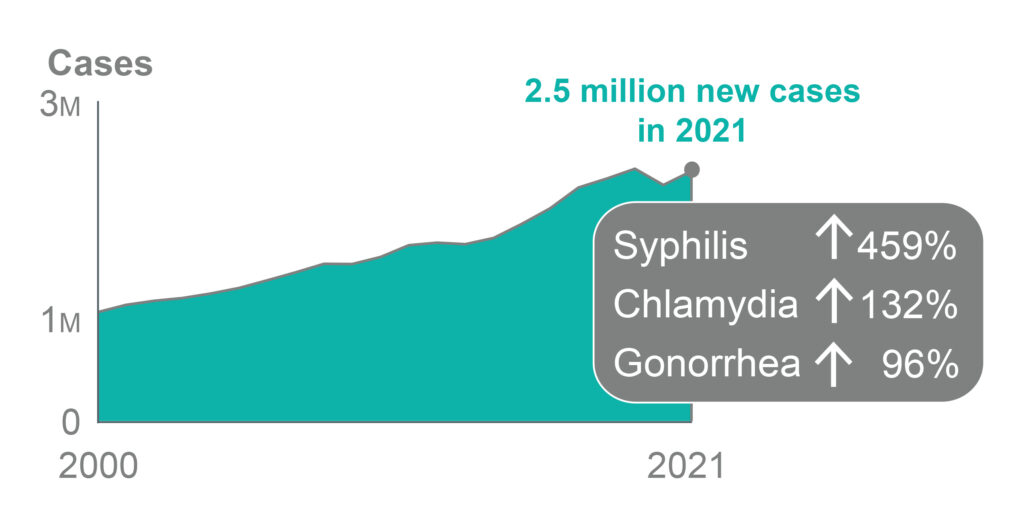STI SCREENING IN BEHAVIORAL HEALTH PROGRAMS
The nation’s opioid epidemic has been linked to outbreaks of STIs, including gonorrhea, chlamydia and syphilis. More than 2.5 million new cases of chlamydia, gonorrhea, and syphilis were reported in 2021.
According to the CDC, it is estimated that 20% of the U.S. population – approximately one in five people in the U.S. – have a sexually transmitted infection.
To address both the opioid and STI epidemics, the CDC recommends a whole-person approach to patient care, which includes integrating screening for STIs into existing programs, such as substance use disorder treatment programs.
710K Gonorrhea cases
176K Syphilis cases
SUPPORTING A WHOLE-PERSON APPROACH TO PATIENT CARE
People living substance use disorders are also at higher risk for poor health outcomes associated with preventable chronic physical health problems, including STIs. A whole-person approach focuses on treating the individual with the goal of improved overall health and well-being regardless of the treatment setting.
Integrating STI screening as a routine practice at intake and throughout the treatment program eliminates critical time missed in treating STIs, helping to prevent serious or potentially fatal complications and decreasing the risk of transmission of disease to others.
Young adults who used an illicit drug in the past year were 3 times more likely to get an STI.
of sexually acquired HIV infections are attributed to chlamydia, gonorrhea and syphilis.
women annually become infertile because of an STI.
Holistic, coordinated care is critical for addressing these overlapping epidemics. A ‘no-wrong-door’ approach – providing or connecting a person to all the services that meet their needs wherever they seek care – is crucial.
Centers for Disease Control and Prevention
Increased Risk of HIV
STIs like chlamydia, gonorrhea, and syphilis increase the chance of acquiring HIV and transmitting HIV to others.
Other Serious or Fatal Health Conditions
Left untreated, chlamydia and gonorrhea can lead to pelvic inflammatory disease (PID), fallopian tube scarring, ectopic pregnancy and infertility in women, and epididymitis in men. Untreated gonorrhea can spread to the blood and cause disseminated gonococcal infection (DGI), which can lead to septic arthritis, tenosynovitis, petechial/pustular skin lesions, and rarely endocarditis or meningitis. Untreated syphilis can spread to the brain and nervous system (neurosyphilis), the eye (ocular syphilis) or the ear (otosyphilis).
Easily Treatable
Chlamydia, gonorrhea and syphilis are easily treated and cured with antibiotics, especially in the early stages.
One Sample Collection for STI and SUD Testing
Navis is able to perform testing for both STIs and substance use disorder treatment from the same sample. No additional collection is required for STI testing.
Molecular testing for STIs is important as it provides precise and targeted approaches to disease diagnosis, treatment selection and monitoring. It enhances healthcare decision-making and improves patient outcomes. Contact us today to learn more about molecular testing options.

